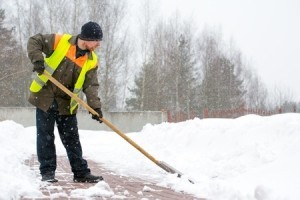 It’s time for winter to bow out gracefully. I certainly felt that a few days ago we awoke to find our gas meter was encased in ice bringing a temporary end to heat, hot water and the kitchen cook top. And while the gas company came to the rescue in fairly short order, the repairs could not be done unless a path was shoveled from the driveway to the meter. That’s when the fun began. Armed with two shovels – one to break the ice, and the other to remove the snow/ice amalgam, I eventually gained passage to the source of the trouble before the technician arrived. Clearly, my best snow-shoveling days behind me.
It’s time for winter to bow out gracefully. I certainly felt that a few days ago we awoke to find our gas meter was encased in ice bringing a temporary end to heat, hot water and the kitchen cook top. And while the gas company came to the rescue in fairly short order, the repairs could not be done unless a path was shoveled from the driveway to the meter. That’s when the fun began. Armed with two shovels – one to break the ice, and the other to remove the snow/ice amalgam, I eventually gained passage to the source of the trouble before the technician arrived. Clearly, my best snow-shoveling days behind me.
But for many workers, snow and ice removal is just part of the job. My private battle with winter 2015 is a mere skirmish when compared to those who risk serious injury while working. In our experience, about one-third of all workplace injuries in winter come as a consequence of snow and ice. And oftentimes, the injuries are serious and the costs are extensive.
For many businesses here in the Northeast, roof snow removal has become necessary. In Record Snow-Related Worker Deaths And Injuries Calls For Employer Precautions posted on the WorkersCompensation.com website, employers are advised to take precautions to promote worker safety when clearing snow from roofs. And the Occupational Safety and Health Administration (OSHA) has issued an OSHA Hazard Alert on the same subject but with much more detail.
“Driving to work on slippery roads is not the only thing workers have to worry about during winter months” says Leigh Ann Morgan of Demand Media. In Injuries in the Workplace During Winter Months, she cites cold stress, slips and falls, snow shoveling injuries and snow blower injuries as major factors.
Clearly, while the risk of injury from roof top snow removal is significant, many other dangers exist. In OSHA WINTER WEATHER Plan. Equip. Train, OSHA offers some great employer advice on a number of winter hazards including:
- Winter Driving
- Work Zone Traffic Safety
- Stranded in a Vehicle
- Shoveling Snow
- Using Powered Equipment like Snow Blowers
- Clearing Snow from Roofs and Working at Heights
- Preventing Slips on Snow and Ice
- Repairing Downed or Damaged Power Lines
- Working Near Downed or Damaged Power Lines
- Removing Downed Trees
According to a report by the National Oceanic and Atmospheric Administration (NOAA) and the American Red Cross on the blizzard of ‘78, 99 deaths occurred in Massachusetts and Rhode Island and more than 4,500 were injured or made ill. And while the counts for this year’s record breaking winter are yet to be completed, it is clear that many workers and the companies they work for have paid a significant price.
Yes, it is time for winter to bow out gracefully. I have hopefully shoveled my last path through snow drifts for the season. But as all New Englanders know, winter can be a guest that is slow to depart. And this is a fact that should not be lost on employers.
For more employer advice on winter weather hazards, please reach out to Genesis HR Solutions at AskUs@genesishrsolutions.com or 800-367-8367.
Genesis HR Solutions is the premier PEO provider for Massachusetts based businesses.





